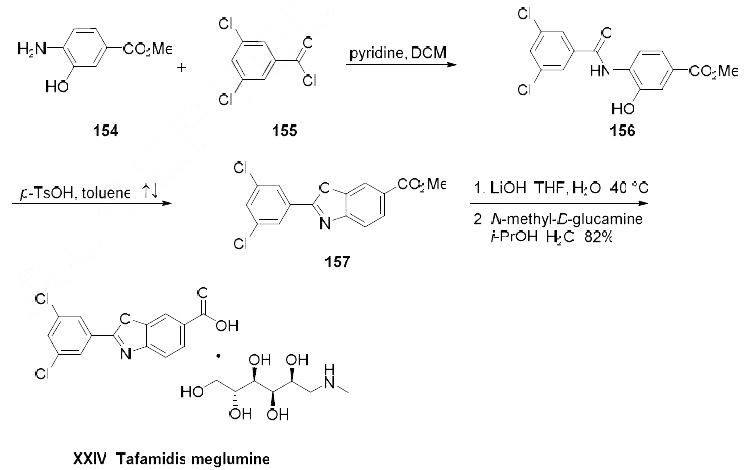| Identification | Back Directory | [Name]
Tafamidis Meglumine | [CAS]
951395-08-7 | [Synonyms]
PF06291826
PF-06291826
cas 594839-88-0
Tafamidis Meglumine
TAFAMIDIS;CAS 594839-88-0;PF-06291826;PF06291826
6-carboxy-2-(3,5-dichlorophenyl)-benzoxazole meglumine | [Molecular Formula]
C21H24Cl2N2O8 | [MDL Number]
MFCD28502032 | [MOL File]
951395-08-7.mol | [Molecular Weight]
503.33 |
| Chemical Properties | Back Directory | [Melting point ]
195 - 198°C | [storage temp. ]
-20°C Freezer, Under inert atmosphere | [solubility ]
DMSO (Sparingly, Heated, Sonicated) | [form ]
Solid | [color ]
White to Off-White | [InChIKey]
DQJDBUPLRMRBAB-KUAVVOKVNA-N | [SMILES]
[C@@H](O)([C@@H](O)CNC)[C@H](O)[C@H](O)CO.ClC1=CC(Cl)=CC(C2=NC3=CC=C(C(=O)O)C=C3O2)=C1 |&1:0,2,7,9,r| |
| Hazard Information | Back Directory | [Description]
In November 2011, the European Commission approved tafamidis
meglumine (Fx-1006A, PF-06291826) for the treatment of transthyretin familial amyloid polyneuropathy (TTR-FAP) in adult patients with stage 1
symptomatic polyneuropathy.
Tafamidis stabilizes both the wild type and mutant forms of TTR tetramer
and prevents tetramer dissociation by noncooperatively binding to the
two thyroxine binding sites. Tafamidis is the first approved medicine for
TTR-FAP. The Kd values for tafamidis for the two thyroxine binding sites
on TTR, as determined by isothermal titration calorimetry, were 3 nM and
278 nM, respectively. In another in vitro study using wild type TTR, V30M
mutant TTR, and V122I mutant TTR, it was shown that tafamidis inhibited
fibril formation in a concentration-dependent manner reaching EC50 at a
tafamidis:TTR stoichiometry of <1 (EC50 was in the range of 2.7–3.2 μM, corresponding to a tafamidis:TTR stoichiometry range of
0.75–0.9). Tafamidis has been synthesized by coupling 4-amino-3-
hydroxybenzoic acid with 3,5-dichlorobenzoyl chloride followed by dehydration using p-toluenesulfonic acid. | [Originator]
Scripps Research Institute (United States) | [Uses]
Tafamidis Meglumine is used as a potential therapeutics for COVID-19 and related viral infections | [Definition]
ChEBI: Tafamidis meglumine is an organoammonium salt obtained by combining tafamidis with one molar equivalent of 1-deoxy-1-(methylamino)-D-glucitol. Used for the amelioration of transthyretin-related hereditary amyloidosis. It has a role as a central nervous system drug. It contains a tafamidis(1-). | [Brand name]
Vyndaqel | [Clinical Use]
Tafamidis meglumine is a transthyretin amyloid inhibitor that was approved for the treatment of
transthyretin amyloid polyneuropathy (ATTR-PN) and transthyretin familial amyloid polyneropathy
(TTR-FAP). These diseases represent a rare autosomal neurodegenerative disorder characterized
by autonomic, sensory and motor impairment which are typically fatal. Tafamidis was discovered at
The Scripps Research Institute and developed by Pfizer. | [Synthesis]
Numerous synthetic routes have been reported
including the use of direct CH activation to form the key biaryl bond. Although only reported on
small scale, the most likely production route is detailed in the scheme.
Condensation of methyl 4-amino-3-hydroxybenzoic acid (154) with 3,5-dichlorobenzoyl chloride
(155) in refluxing pyridine gave intermediate amide 156 which underwent cycylization upon treatment
with p-TsOH in refluxing toluene producing benzoxazole 157. Saponification of the methyl ester with
LiOH (aq.) afforded tafamidis. The free acid was treated with N-methyl-D-glutamine to provide
tafamidis meglumine (XXIV) in 82% yield. |
|
|